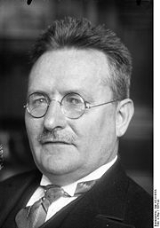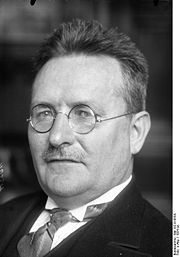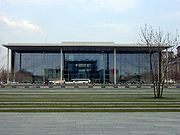
Paul Löbe
Encyclopedia

Germany
Germany , officially the Federal Republic of Germany , is a federal parliamentary republic in Europe. The country consists of 16 states while the capital and largest city is Berlin. Germany covers an area of 357,021 km2 and has a largely temperate seasonal climate...
politician
Politician
A politician, political leader, or political figure is an individual who is involved in influencing public policy and decision making...
and member of the Social Democratic Party of Germany
Social Democratic Party of Germany
The Social Democratic Party of Germany is a social-democratic political party in Germany...
(SPD).
Life and career
Löbe was born in LiegnitzLegnica
Legnica is a town in south-western Poland, in Silesia, in the central part of Lower Silesia, on the plain of Legnica, riverside: Kaczawa and Czarna Woda. Between 1 June 1975 and 31 December 1998 Legnica was the capital of the Legnica Voivodeship. It is currently the seat of the county...
in the Prussian
Kingdom of Prussia
The Kingdom of Prussia was a German kingdom from 1701 to 1918. Until the defeat of Germany in World War I, it comprised almost two-thirds of the area of the German Empire...
Province of Silesia
Province of Silesia
The Province of Silesia was a province of the Kingdom of Prussia from 1815 to 1919.-Geography:The territory comprised the bulk of the former Bohemian crown land of Silesia and the County of Kladsko, which King Frederick the Great had conquered from the Austrian Habsburg Monarchy in the 18th...
. He was trained as a typesetter and in 1898 he founded the local branch of the SPD in Ilmenau
Ilmenau
Ilmenau is a town located in the district of Ilm-Kreis, Thuringia, Germany.Ilmenau is situated in the valley of the Ilm river, at an altitude of 431 metres above sea level, and is the biggest town in Ilm-Kreis district, with 6,200 students studying at the Technische Universität Ilmenau. The...
, Thuringia
Thuringia
The Free State of Thuringia is a state of Germany, located in the central part of the country.It has an area of and 2.29 million inhabitants, making it the sixth smallest by area and the fifth smallest by population of Germany's sixteen states....
, where he also worked in a printing works. From 1900-20 he was the editor-in-chief of the Breslau Volkswacht. His journalistic work often landed him in prison, for instance, when he called on readers to come to a demonstration to protest against the Prussian three-class franchise
Prussian three-class franchise
After the 1848 revolutions in the German states, the Prussian three-class franchise system was introduced in 1849 by the Prussian king Friedrich Wilhelm IV for the election of the Lower House of the Prussian state parliament. It was completely abolished only in 1918...
. In 1901 he married Clara Schaller. Löbe did not serve in World War I
World War I
World War I , which was predominantly called the World War or the Great War from its occurrence until 1939, and the First World War or World War I thereafter, was a major war centred in Europe that began on 28 July 1914 and lasted until 11 November 1918...
on account of an illness in his lungs.
Löbe was imprisoned by the Nazi Party after the Machtergreifung
Machtergreifung
Machtergreifung is a German word meaning "seizure of power". It is normally used specifically to refer to the Nazi takeover of power in the democratic Weimar Republic on 30 January 1933, the day Hitler was sworn in as Chancellor of Germany, turning it into the Nazi German dictatorship.-Term:The...
in 1933, and again in 1944 after the July 20 Plot
July 20 Plot
On 20 July 1944, an attempt was made to assassinate Adolf Hitler, Führer of the Third Reich, inside his Wolf's Lair field headquarters near Rastenburg, East Prussia. The plot was the culmination of the efforts of several groups in the German Resistance to overthrow the Nazi-led German government...
because of his connections with Carl Friedrich Goerdeler
Carl Friedrich Goerdeler
Carl Friedrich Goerdeler was a monarchist conservative German politician, executive, economist, civil servant and opponent of the Nazi regime...
's resistance circle.
In 1945 Löbe joined the staff of the daily newspaper
Newspaper
A newspaper is a scheduled publication containing news of current events, informative articles, diverse features and advertising. It usually is printed on relatively inexpensive, low-grade paper such as newsprint. By 2007, there were 6580 daily newspapers in the world selling 395 million copies a...
Das Volk, and later became co-publisher of the Telegraf. He died in West Germany
West Germany
West Germany is the common English, but not official, name for the Federal Republic of Germany or FRG in the period between its creation in May 1949 to German reunification on 3 October 1990....
's capital, Bonn
Bonn
Bonn is the 19th largest city in Germany. Located in the Cologne/Bonn Region, about 25 kilometres south of Cologne on the river Rhine in the State of North Rhine-Westphalia, it was the capital of West Germany from 1949 to 1990 and the official seat of government of united Germany from 1990 to 1999....
.
Politics
Löbe joined the SPD in 1895 and was briefly its leader in 1933. After World War IIWorld War II
World War II, or the Second World War , was a global conflict lasting from 1939 to 1945, involving most of the world's nations—including all of the great powers—eventually forming two opposing military alliances: the Allies and the Axis...
, he was instrumental in the reconstruction of the party.
Elected positions
Löbe was elected to Breslau's city government in 1904 and he served as a member of the provincial LandtagLandtag
A Landtag is a representative assembly or parliament in German-speaking countries with some legislative authority.- Name :...
of Silesia
Silesia
Silesia is a historical region of Central Europe located mostly in Poland, with smaller parts also in the Czech Republic, and Germany.Silesia is rich in mineral and natural resources, and includes several important industrial areas. Silesia's largest city and historical capital is Wrocław...
(1915–20). In 1919 he became the vice president of the Weimar
Weimar Republic
The Weimar Republic is the name given by historians to the parliamentary republic established in 1919 in Germany to replace the imperial form of government...
National Assembly and from 1920 to 1933 he was a member of the German Reichstag
Reichstag (Weimar Republic)
The Reichstag was the parliament of Weimar Republic .German constitution commentators consider only the Reichstag and now the Bundestag the German parliament. Another organ deals with legislation too: in 1867-1918 the Bundesrat, in 1919–1933 the Reichsrat and from 1949 on the Bundesrat...
, serving as its president (1920–24 and 1925–32) and vice-president (1932–33). In 1921 he became a member of the Prussian state council.
Löbe was a member of the Parlamentarischer Rat
Parlamentarischer Rat
The Parlamentarischer Rat was the West German constitutional convention that created the current constitution of the Federal Republic of Germany...
between 1948 and 1949 and the deputy chairman of the SPD faction. From 1949-53, he was a member of the Bundestag
Bundestag
The Bundestag is a federal legislative body in Germany. In practice Germany is governed by a bicameral legislature, of which the Bundestag serves as the lower house and the Bundesrat the upper house. The Bundestag is established by the German Basic Law of 1949, as the successor to the earlier...
. Löbe was the oldest member of the Bundestag in its first legislative period, though he was not an elected member, but rather appointed by the Senate of West Berlin
Senate of Berlin
The Senate of Berlin is the executive body governing the city of Berlin, which at the same time is a state of Germany. According to the Constitution of Berlin the Senate consists of the Governing Mayor of Berlin and up to eight Senators appointed by the Governing Mayor, two of whom are appointed ...
as their non-voting delegate to Bonn
Bonn
Bonn is the 19th largest city in Germany. Located in the Cologne/Bonn Region, about 25 kilometres south of Cologne on the river Rhine in the State of North Rhine-Westphalia, it was the capital of West Germany from 1949 to 1990 and the official seat of government of united Germany from 1990 to 1999....
. The second oldest member was Konrad Adenauer
Konrad Adenauer
Konrad Hermann Joseph Adenauer was a German statesman. He was the chancellor of the West Germany from 1949 to 1963. He is widely recognised as a person who led his country from the ruins of World War II to a powerful and prosperous nation that had forged close relations with old enemies France,...
, whom Löbe survived by three and a half months.
Honorary positions

Bundesverdienstkreuz
The Order of Merit of the Federal Republic of Germany is the only general state decoration of the Federal Republic of Germany. It has existed since 7 September 1951, and between 3,000 and 5,200 awards are given every year across all classes...
. In 1955 he became an honorary citizen of Berlin
Berlin
Berlin is the capital city of Germany and is one of the 16 states of Germany. With a population of 3.45 million people, Berlin is Germany's largest city. It is the second most populous city proper and the seventh most populous urban area in the European Union...
. One of the new parliamentary buildings which serves Bundestag members in Berlin is named after Löbe.
Funeral Ceremony
At the time of his state funeral in August 1967 Andreas BaaderAndreas Baader
Andreas Bernd Baader was one of the first leaders of the German left-wing militant organization Red Army Faction, also commonly known as the Baader-Meinhof Gang.- Life :...
(later a notorious Red Army Faction
Red Army Faction
The radicalized were, like many in the New Left, influenced by:* Sociological developments, pressure within the educational system in and outside Europe and the U.S...
terrorist), the famous author Hans Magnus Enzensberger
Hans Magnus Enzensberger
Hans Magnus Enzensberger , is a German author, poet, translator, and editor. He has also written under the pseudonym Andreas Thalmayr. He lives in Munich.- Life :...
, and others carried an empty coffin bearing the words “SENAT” to the front of the Berlin Schöneberg City Hall, where a commemorative ceremony was being held. Fellow demonstrators passed out leaflets proclaiming “Today you want to celebrate Paul Löbe up the chimney […] We want to bury a few smart corpses that are slowly stinking to high heaven,” followed by a list of the current members of the Berlin Senate. Although 24 of the demonstrators were arrested, some participants evaded the police, including Baader, Enzensberger and another later RAF terrorist, Gudrun Ensslin
Gudrun Ensslin
Gudrun Ensslin was a founder of the German militant group Red Army Faction . After becoming involved with co-founder Andreas Baader, Ensslin was influential in the politicization of Baader's voluntaristic anarchistic beliefs. Ensslin was perhaps the intellectual head of the RAF...
.
Publications
- Löbe, Paul, Erinnerungen eines Reichstagspräsidenten, Berlin 1949, republished as Der Weg war lang: Lebenserinnerungen, Berlin, 1953, 1954, 2002 (fifth edition).
- Löbe, Paul, "Gegenwartsfragen des Parlamentarismus," in: Für und Wider. Lebensfragen deutscher Politik, Offenbach am Main, 1952, pp. 39 to 48.
- Löbe, Paul, "Aus dem Parlamentarischen Leben," in: Hessische Hochschulwochen für Staatswissenschaftliche Fortbildung, Volume 3, 1953, pp. 312 to 318.

